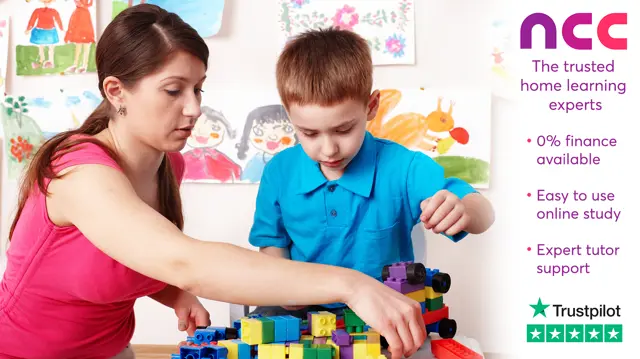
Diploma for the Early Years Workforce (EYE) Level 3 RQF
Enquire Now for £50 off | Expert tutors, Course and Certificate all inclusive - Study at home via Online or Paper study
NCC Home Learning
Summary
Apply now via Reed to get a discount on this course
12 month interest-free payment plan available
- OFQUAL Level 3 NCFE RQF - e-Certificate - Free
- OFQUAL Level 3 NCFE RQF Hard Copy Certificate - Free
- Exam(s) / assessment(s) is included in price
- Tutor is available to students
- TOTUM card available but not included in price What's this?
Add to basket or enquire
Overview
The Diploma for the Early Years Workforce (Early Years Educator) Level 3 RQF qualifies students to be Early Years Educators, enabling them to count in the Level 3 staff to child ratios in childcare settings. This is an Ofqual regulated qualification which is listed as meeting the Department for Education’s criteria for counting in the Early Years Foundation Stage Framework staff to child ratios.
Qualification
Level 3 Diploma for the Children's Workforce (Early Years Educator) (RQF)
Description
The learning materials found within this course have been separated into 3 key themes:
- Health and well-being.
- Legislation, frameworks and professional practice.
- Play, development and learning for school readiness.
Theme 1: Health and well-being:
- Unit 1: Support healthy lifestyles for children through the provision of food and nutrition.
- Unit 2: Support healthy lifestyles for children through exercise.
- Unit 3: Support physical care routines for children.
- Unit 4: Promote children’s emotional well-being.
- Unit 5: Understand how to support children who are unwell.
Theme 2: Legislation, frameworks and professional practice:
- Unit 6: Understand legislation relating to the safeguarding, protection and welfare of children.
- Unit 7: Use legislation relating to the health and safety of children.
- Unit 8: Follow legislation relating to equality, diversity and inclusive practice.
- Unit 9: Working in partnership.
- Unit 10: Engage in professional development.
Theme 3: Play, development and learning for school readiness.
- Unit 11: Understand the value of play in Early Years.
- Unit 12: Plan, lead and review play opportunities which support children’s learning and development.
- Unit 13: Promote enabling play environments.
- Unit 14: Developing children’s emergent literacy skills.
- Unit 15: Developing children’s emergent mathematical skills.
- Unit 16: Support children’s transition to school.
- Unit 17: Develop children’s cognitive skills.
- Unit 18: Promote children’s speech, language and communication.
- Unit 19: Promoting children’s physical development.
- Unit 20: Promoting children’s personal, social and emotional development.
- Unit 21: Support children with additional needs.
Unit 22: Use observation, assessment and planning to promote the development of children.
Unit 23: Use longitudinal studies to observe, assess and plan for children’s needs.
Who is this course for?
This qualification is recommended for those who aspire to work with children aged 0 to 5, learners will also have the opportunity to gain knowledge of children aged 5 to 7 years throughout the course content. As a qualified level 3 early years educator you will be able to gain employment in roles including:
- Nursery Nurse
- Children's centre worker
- Early years educator
- Early years teacher
- Private nanny
- Childminder
- Playschool attendant
Upon completion of this qualification, it is intended that learners will have the knowledge and experience required to become a full practitioner in early years’ education.
Requirements
There is no previous learning knowledge or experience needed to enrol on to this programme however, students must be over 16 years of age. You will also require a placement in an early years’ setting in mainland England with support from a workplace mentor/manager.
Career path
As a qualified level 3 early years educator you will be able to gain employment in roles including:
- Nursery Nurse
- Children's centre worker
- Early years educator
- Early years teacher
- Private nanny
- Childminder
- Playschool attendant
Questions and answers
Certificates
OFQUAL Level 3 NCFE RQF - e-Certificate
Digital certificate - Included
OFQUAL Level 3 NCFE RQF Hard Copy Certificate
Hard copy certificate - Included
Reviews
Currently there are no reviews for this course. Be the first to leave a review.
Legal information
This course is advertised on reed.co.uk by the Course Provider, whose terms and conditions apply. Purchases are made directly from the Course Provider, and as such, content and materials are supplied by the Course Provider directly. Reed is acting as agent and not reseller in relation to this course. Reed's only responsibility is to facilitate your payment for the course. It is your responsibility to review and agree to the Course Provider's terms and conditions and satisfy yourself as to the suitability of the course you intend to purchase. Reed will not have any responsibility for the content of the course and/or associated materials.



